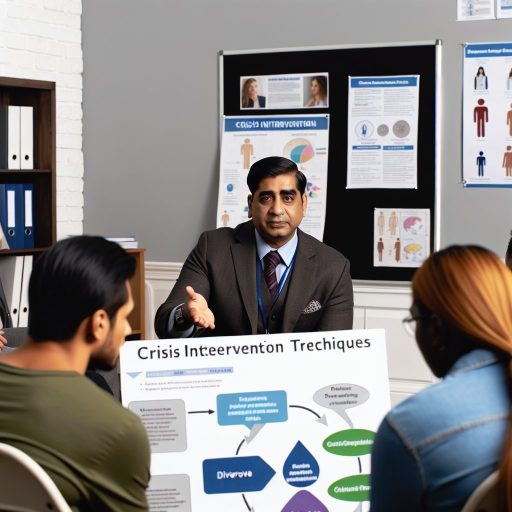In the field of counseling, vicarious trauma is a significant concern that needs to be addressed.
Vicarious trauma refers to the emotional toll that counselors experience as a result of hearing about their clients’ traumatic experiences.
This type of trauma can have a lasting impact on counselors’ mental health and well-being if not properly managed.
It is crucial to address vicarious trauma in counseling because counselors are often exposed to intense emotions and challenging situations.
Counselors may become deeply empathetic towards their clients, which can lead to feelings of helplessness, anxiety, and even burnout.
If left unchecked, vicarious trauma can hinder counselors’ ability to provide effective and empathetic care to their clients.
Moreover, when counselors are not equipped to recognize and address vicarious trauma, they may inadvertently retraumatize their clients or develop maladaptive coping mechanisms.
This can not only harm the counselor-client relationship but also perpetuate a cycle of trauma within the counseling environment.
Therefore, it is essential for counselors to prioritize their own mental health and well-being in order to prevent vicarious trauma.
By implementing self-care strategies, seeking supervision or consultation, and engaging in regular debriefing sessions, counselors can better cope with the emotional demands of their work.
This can significantly mitigate the risk of vicarious trauma.
Understanding vicarious trauma:
- Explain what vicarious trauma is and how it differs from burnout and compassion fatigue.
- Discuss how vicarious trauma can impact counselors emotionally, mentally, and physically.
What is vicarious trauma?
Vicarious trauma, also known as secondary trauma, refers to the emotional, mental, and physical toll that counselors experience when they work with clients who have experienced trauma.
It differs from burnout, which is a result of prolonged stress and exhaustion.
Additionally, compassion fatigue is a state of emotional and physical exhaustion caused by helping others.
Impact on counselors:
Emotionally, counselors may experience symptoms such as increased anxiety, depression, irritability, and a sense of hopelessness.
They may also struggle with intrusive thoughts or nightmares related to their clients’ experiences.
Mental challenges include difficulty concentrating, making decisions, or remembering important details.
Transform Your Career Today
Unlock a personalized career strategy that drives real results. Get tailored advice and a roadmap designed just for you.
Start NowFeelings of guilt or self-doubt may arise regarding their ability to help clients effectively.
Physically, vicarious trauma can manifest in symptoms like headaches, fatigue, insomnia, digestive issues, and muscle tension.
Counselors may also experience changes in appetite or weight, as well as a weakened immune system.
Vicarious trauma can have a profound impact on counselors’ well-being.
It affects their ability to provide effective care to clients, and leads to feelings of burnout and compassion fatigue.
Recognizing signs of vicarious trauma:
Feeling emotionally drained or overwhelmed after counseling sessions.
Having intrusive thoughts or nightmares related to clients’ experiences.
Experiencing difficulty separating work from personal life.
Feeling numb or detached from clients’ stories.
These common symptoms of vicarious trauma in counselors can have significant impacts on their well-being and ability to provide effective care to clients.
It is crucial for counselors to be aware of these signs and take proactive steps to address them.
Examples of behaviors and attitudes that may indicate vicarious trauma is present:
- Increased irritability or anger towards clients or colleagues.
- Avoidance of certain clients or topics that trigger emotional distress.
- Engaging in unhealthy coping mechanisms such as substance abuse or overeating.
- Feeling a sense of hopelessness or cynicism about the impact of counseling.
Recognizing these indicators early on can help counselors seek the support and resources needed to prevent further harm to themselves and their clients.
It is essential to prioritize self-care and seek supervision or therapy when vicarious trauma is detected.
Counselors must also build a strong support system of colleagues, mentors, and friends who can provide validation and understanding.
By monitoring their own well-being and practicing self-care, counselors can continue to provide effective and compassionate care to those they serve.
Discover More: Navigating Child Custody Issues in Domestic Violence Cases
Strategies for self-care:
Consider practicing mindfulness and meditation to help counselors stay present and grounded.
Engage in regular physical exercise to release stress and tension from the body.
Make time for hobbies and activities that bring joy and relaxation outside of work.
Prioritize adequate sleep and maintain a healthy diet to support overall well-being.
Transform Your Career Today
Unlock a personalized career strategy that drives real results. Get tailored advice and a roadmap designed just for you.
Start NowConnect with nature by taking walks or spending time outdoors to rejuvenate the mind.
Offer practical self-care tips and techniques for counselors to prevent and address vicarious trauma:
It is essential for counselors to prioritize self-care to prevent burnout and effectively address any vicarious trauma experienced in their work with clients.
Here are some practical tips and techniques for counselors to incorporate into their self-care routine:
- Set boundaries:
- Establish clear boundaries between work and personal life to prevent emotional exhaustion and maintain a healthy work-life balance.
- Practice self-compassion:
- Be kind to yourself and acknowledge that it is normal to experience emotional reactions to clients’ stories and struggles.
- Seek supervision and support:
- Regularly consult with supervisors or colleagues to process challenging cases and seek guidance on how to best support clients.
- Engage in peer support:
- Connect with other counselors or mental health professionals to share experiences, gain insights, and provide mutual support.
- Attend training and workshops:
- Participate in continuing education opportunities focused on vicarious trauma, self-care, and stress management techniques.
- Practice self-reflection:
- Take time to reflect on personal reactions and responses to client work and consider seeking therapy to process any unresolved feelings or emotions.
Discuss the importance of boundary setting and seeking support from supervisors and colleagues:
Setting clear boundaries and seeking support from supervisors and colleagues are crucial strategies for counselors to address vicarious trauma effectively and maintain their well-being.
Here’s why these practices are essential:
- Protect against emotional fatigue:
- Establishing boundaries helps prevent emotional exhaustion and burnout by maintaining a healthy separation between work and personal life.
- Promote healthy relationships:
- Clear boundaries contribute to healthier relationships with clients and colleagues, enhancing the quality of care provided to clients.
- Enhance self-awareness:
- Seeking supervision and support allows counselors to gain insights into their reactions and responses to client work, fostering self-awareness and growth.
- Encourage professional growth:
- Collaborating with supervisors and colleagues provides opportunities for learning, skill development, and professional growth in the counseling field.
See Related Content: Public Health Social Work and Emergency Preparedness
Building resilience:
As counselors, it is essential to explore ways to build resilience and strengthen emotional well-being when dealing with vicarious trauma.
Here are some key strategies to consider:
Self-care practices:
- Engage in regular exercise to boost mood and reduce stress levels.
- Prioritize healthy eating habits to fuel the body and mind.
- Ensure an adequate amount of sleep to promote overall well-being.
- Set boundaries to maintain a healthy work-life balance.
- Seek support from colleagues, supervisors, or a therapist when needed.
Developing coping mechanisms:
- Practice deep breathing exercises to manage stress in challenging situations.
- Utilize relaxation techniques such as progressive muscle relaxation to unwind.
- Engage in hobbies or activities that bring joy and promote relaxation.
- Journaling thoughts and feelings can provide an outlet for processing emotions.
- Attend regular counseling sessions to address personal needs and challenges.
Mindfulness and meditation:
- Integrate mindfulness practices into daily routines to stay present and grounded.
- Attend mindfulness workshops or training to enhance mindfulness skills.
- Practice meditation techniques to promote relaxation and reduce stress.
- Engage in mindfulness-based stress reduction programs for long-term benefits.
- Participate in mindfulness retreats or retreat centers to deepen practice.
Seeking professional support:
- Consult with a therapist or counselor for individualized support and guidance.
- Participate in supervision or peer support groups to process challenging cases.
- Attend workshops or trainings on vicarious trauma to enhance awareness.
- Engage in ongoing professional development to stay informed and resilient.
- Utilize resources such as books, articles, and online forums for additional support.
By incorporating these strategies and practices into daily routines, counselors can effectively build resilience and strengthen their emotional well-being when addressing vicarious trauma.
Remember, self-care is essential in maintaining a healthy and sustainable counseling practice.
Find Out More: The Role of Health Educators in Disease Prevention
Seeking Help and Support:
- Highlight the importance of seeking professional help if experiencing vicarious trauma symptoms.
- Discuss the benefits of therapy and counseling for counselors dealing with vicarious trauma.
Importance of Seeking Professional Help
When counselors are experiencing symptoms of vicarious trauma, it is crucial for them to seek professional help.
Ignoring these symptoms can lead to burnout, decreased job satisfaction, and compromised mental health.
Professional help, such as therapy and counseling, can provide counselors with the tools and support they need to address their vicarious trauma effectively.
Therapists trained in trauma can help counselors process their emotions, set boundaries, and develop coping strategies.
Benefits of Therapy and Counseling
Therapy and counseling offer a safe and confidential space for counselors to explore their feelings and experiences related to vicarious trauma.
This form of support allows counselors to process their emotions without the fear of judgment.
Through therapy, counselors can gain insight into how vicarious trauma is impacting their well-being and develop healthier coping mechanisms.
Counseling can also help counselors identify triggers and learn how to manage stress more effectively.
Additionally, therapy and counseling can assist counselors in setting boundaries with clients and colleagues, helping them maintain a healthy work-life balance.
Transform Your Career Today
Unlock a personalized career strategy that drives real results. Get tailored advice and a roadmap designed just for you.
Start NowBy addressing vicarious trauma in therapy, counselors can prevent burnout and continue to provide quality care to their clients.
See Related Content: How Adoption Counselors Prepare Families for Adoption

Importance of Supervision and Debriefing:
Supervision and debriefing play a crucial role in recognizing and addressing vicarious trauma.
Supervisors should create a safe space for counselors to process their experiences and emotions.
Regular supervision sessions can help counselors identify signs of vicarious trauma early on.
Debriefing sessions provide an opportunity for counselors to reflect on challenging cases and emotions.
Supervisors should encourage counselors to practice self-care and set healthy boundaries.
Open communication between supervisors and counselors is essential in addressing vicarious trauma effectively.
Supervisors can provide resources and referrals for counselors experiencing vicarious trauma.
Creating a supportive and non-judgmental environment during supervision can help counselors feel heard and understood.
Supervisors should be knowledgeable about vicarious trauma and its impact on counselors’ well-being.
Regular check-ins and follow-ups can help supervisors monitor counselors’ mental health and well-being.
Advocating for systemic change:
- Recognize the need for systemic changes in the counseling field to reduce vicarious trauma risks.
- Promote a culture of self-care and mental health support within counseling organizations.
Addressing the need for systemic changes in counseling
It is essential to acknowledge that vicarious trauma is a pervasive issue in the counseling field.
To address this, systemic changes must be implemented to create a safer and more supportive environment for counselors.
One way to achieve this is by advocating for increased training and education on vicarious trauma within counseling programs.
By incorporating this into the curriculum, future counselors can be better prepared to recognize and address the signs of vicarious trauma in themselves and their colleagues.
Furthermore, there is a need for policies and protocols within counseling organizations that prioritize the well-being of counselors.
This can include regular check-ins, access to mental health resources, and a supportive work culture that encourages open communication about the challenges of the job.
Promoting a culture of self-care and mental health support
Creating a culture of self-care and mental health support within counseling organizations is crucial in preventing and addressing vicarious trauma.
Counselors must prioritize their well-being to effectively help others.
Transform Your Career Today
Unlock a personalized career strategy that drives real results. Get tailored advice and a roadmap designed just for you.
Start NowOne way to promote this culture is by offering regular mental health check-ins and counseling services to counselors.
Providing a safe space for counselors to process their emotions and experiences can help prevent burnout and vicarious trauma.
Additionally, counseling organizations can implement wellness programs that focus on self-care practices such as mindfulness, exercise, and healthy eating.
By encouraging counselors to prioritize their physical and mental health, organizations can reduce the risk of vicarious trauma and improve overall well-being.
Recognizing and Addressing Vicarious Trauma in Counseling
Recognizing and addressing vicarious trauma in counseling is crucial for the well-being of counselors and their clients.
It is essential for counselors to prioritize self-care and seek help when needed to prevent vicarious trauma.
Key points include understanding the signs of vicarious trauma, setting boundaries, practicing self-awareness, and seeking supervision and support.
By recognizing the impact of vicarious trauma and taking proactive steps to address it, counselors can continue to provide effective care to their clients.
Self-care and seeking help when needed are essential strategies in preventing and addressing vicarious trauma in counseling.
Additional Resources
Supporting Child and Student Social, Emotional, Behavioral, and …
Helping Teachers Manage the Weight of Trauma | Harvard Graduate …
[E-Books for Sale]
The Big Book of 500 High-Paying Jobs in America: Unlock Your Earning Potential
$19.99 • 500 High-Paying Jobs • 330 pages
Explore 500 high-paying jobs in America and learn how to boost your career, earn more, and achieve success!
See All 500 High-Paying Jobs of this E-Book
1001 Professions Without a Degree: High-Paying American Jobs You Can Start Now
$19.99 • 1001 Professions Without a Degree • 174 pages
Discover 1001 high-paying jobs without a degree! Unlock career tips, skills, and success strategies for just $19.99!




